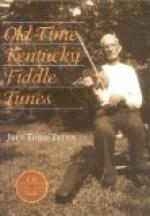Holton, recovering himself quickly, spoke calmly, propitiatingly. “My name’s Holton. I want to see th’ gal as lives up yander. Want to buy her land of her.”
Lorey, satisfied by this explanation that the stranger was not a government agent, as he had, at first suspected, relaxed his tense rigidity of muscles. From fear of revenuers his disturbed mind returned quickly to the bitterness of his resentment of what he thought Madge Brierly’s infatuation for the young lowlander.
“It’s too late,” he said. “Thar’s only one man as she’d let down that bridge for, now—th’ man I thought ye might be—Frank Layson.”
Holton, quick to see the possibility of gaining an advantage, realizing from the young man’s tone that he was certainly no friend of Layson’s, guessing, with quick cunning, at what the situation was, decided that the thing for him to do was to reveal the fact that, in his heart, he, also, hated Layson.
“So ye took me for a revenuer or Frank Layson, eh?” said he. “I know what th’ mountings think o’ revenuers, an’ I reckon, from yer handlin’ o’ that rifle, that you’re no friend o’ Layson’s.”
Joe, full of the fierce bitterness of his resentment, was ready to confide in anyone his hatred of the “furriner” who had come up and won the girl he loved. He let the barrel of his rifle slip between his fingers till its stock was resting on the ground.
“I hates him as I hates but one man in th’ world!” he said, with bitter emphasis.
“Who’s that?” said Holton, thoughtlessly, although, an instant afterward, he was sorry that he had pursued the subject.
“Lem Lindsay,” Lorey answered; “him as killed my father. Frank Layson’s come between me an’ Madge Brierly, an’ he’s got to cl’ar my tracks!” His voice thrilled with the intensity of his emotion, and, suddenly, he caught his rifle up, again, into his crooked elbow, where it rested ready for quick usage. “If you plans to warn him—” he began.
“Warn him!” said the older man, with a bitterness, real or counterfeited, whichever it might be, as fierce as that which rang in the young moonshiner’s own voice, “I hate him as much as you. I’d rather warn you.”
“Warn me o’ what?” Lorey had begun to lose suspicion of the stranger. If, really, he hated Layson, he might make of him a useful ally.
“Your name’s Lorey,” Holton answered, with his keen eyes fixed intently on those of the man who stood there, tensely listening to him, “an’ yo’ keep a still.”
Now Lorey again caught his rifle quickly in both hands; his face showed new apprehension, and a terrible determination, desperate and dreadful. If this stranger knew about the still, was it not certain that he was a government spy and therefore worthy of quick death?
“Keerful!” he said menacingly. “Hyar in th’ mountings that word’s worth your life!” The youth, with frowning brow and glittering, wolfish eyes, stood facing Holton like an animal at bay, with what amounted to a threat of murder on his lips.




